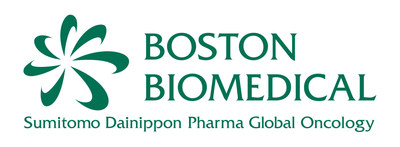CAMBRIDGE, Mass., Oct. 10, 2017 /PRNewswire/ -- Boston Biomedical, Inc., an industry leader in the development of next-generation cancer therapeutics, today announced the U.S. Food and Drug Administration (FDA) has granted Orphan Drug Designation (ODD) for DSP-7888, an investigational cancer peptide vaccine, for the treatment of brain cancer. This is the second ODD for DSP-7888 this year. The first was granted in June 2017 for myelodysplastic syndrome.

DSP-7888 contains peptides to induce Wilms' tumor gene 1 (WT1)-specific cytotoxic T lymphocytes and helper T cells, which attack WT1-expressing cancerous cells found in various types of hematologic and solid cancers. The National Cancer Institute ranked WT1 as the number one priority target for cancer immunotherapy.1 We are evaluating DSP-7888 in phase 1 and 2 studies for patients with pediatric high grade gliomas, myelodysplastic syndrome, recurrent or progressive glioblastoma, and other malignant cancers.
"We are pleased to receive the second orphan drug designation for DSP-7888 this year, which strengthens our belief in this innovative cancer therapy and its potential to provide a meaningful treatment advancement for people with brain cancer who often face a poor prognosis," said Patricia S. Andrews, Chief Executive Officer, Boston Biomedical, Inc. "We are dedicated to developing novel treatments for patients with high unmet need malignancies and look forward to further study of this candidate."
It is estimated that approximately 23,800 malignant brain or spinal cord tumors will be diagnosed this year in the U.S., leading to 16,700 deaths.2 The FDA's ODD program provides special status and development incentives for drugs and biologics which are intended for the safe and effective treatment, diagnosis, or prevention of rare diseases and disorders that affect fewer than 200,000 people in the U.S.3
About DSP-7888
DSP-7888 is an investigational cancer peptide vaccine containing peptides that induce Wilms' tumor gene 1 (WT1)-specific cytotoxic T lymphocytes and helper T cells, which attack WT1-expressing cancerous cells found in various types of hematologic and solid cancers. By adding helper T cell-inducing peptides, improved efficacy may be achieved, compared to a killer peptide treatment regimen alone.
DSP-7888 is currently being investigated in three monotherapy studies: a phase 1/2 study in myelodysplastic syndrome (NCT02436252), a phase 1/2 study in pediatric patients with relapsed or refractory high grade gliomas (NCT02750891), and a phase 1 study in advanced malignancies (NCT02498665). DSP-7888 is also being evaluated in combination with bevacizumab in a phase 2 study in patients with recurrent or progressive glioblastoma (NCT03149003). More information on DSP-7888 and ongoing clinical trials can be found at www.BostonBiomedical.com.
About Boston Biomedical, Inc.
Boston Biomedical, Inc. was founded in November 2006 and is wholly owned by Sumitomo Dainippon Pharma Co., Ltd. Boston Biomedical's mission is to develop the next generation of cancer therapeutics by creating drugs designed to target cancer stemness pathways. Boston Biomedical's innovation in drug discovery has received a number of recognitions and awards in the U.S., including the Frost & Sullivan 2010 North American Drug Discovery Technology Innovation of the Year Award, the National Cancer Institute cancer stem cell initiative grant award in 2010, and the 2011 Biotech Pioneer Award at the Alexandria Oncology Summit. The company also received the "Company To Watch" award in the 10th Annual Team Massachusetts Economic Impact Awards in 2013. Boston Biomedical is headquartered in Cambridge, Massachusetts, USA.
Additional information about the company and its product pipeline can be found at www.BostonBiomedical.com.
Disclaimer Regarding Forward-Looking Statements
The forward-looking statements in this press release are based on management's assumptions and beliefs in light of information presently available, and involve both known and unknown risks and uncertainties. Any forward looking statements set forth in this press release speak only as of the date of this press release. We do not undertake to update any of these forward-looking statements to reflect events or circumstances that occur after the date hereof. Information concerning pharmaceuticals (including compounds under development) contained within this material is not intended as advertising or medical advice.
For general inquiries:
Boston Biomedical, Inc.
617-674-6800
For media inquiries:
Stephanie Bukantz
CHAMBERLAIN PR
212-849-9440
stephanie.bukantz@inventivhealth.com
1 Cheever, M., Allison, J.P., Ferris, A.S., Finn, O.J., Hastings, B.M., Hecht, T.T. (2009) The Prioritization of Cancer Antigens: A National Cancer Institute Pilot Project for the Acceleration of Translational Research. Clinical Cancer Research.http://clincancerres.aacrjournals.org/content/15/17/5323.full-text.pdf. Accessed October 2017.
2 American Cancer Society. About Brain and Spinal Cord Tumors in Adults.
https://www.cancer.org/content/dam/CRC/PDF/Public/8567.00.pdf. Accessed October 2017.
3 FDA. Developing Products for Rare Diseases & Conditions. http://www.fda.gov/forindustry/developingproductsforrarediseasesconditions/ucm2005525.htm. Accessed October 2017.
View original content with multimedia:http://www.prnewswire.com/news-releases/boston-biomedical-announces-orphan-drug-designation-by-fda-for-investigational-wt1-cancer-peptide-vaccine-dsp-7888-in-brain-cancer-300533404.html
SOURCE Boston Biomedical, Inc.





